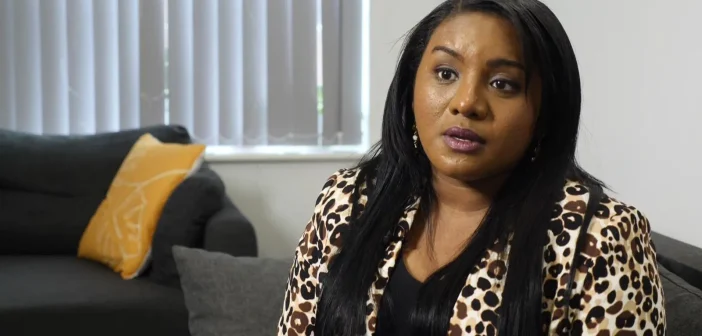Britain’s Sudanese community is demanding the government does more to help bring their relatives – including NHS doctors – back from Sudan.
Two planes were sent out from RAF Akrotiri in Cyprus to evacuate UK diplomats from Khartoum – but other British citizens have not yet received support to leave the country.
Prime Minister Rishi Sunak said the evacuation of the diplomats and their families was “complex and rapid” and followed threats to embassy staff in the capital.
More than 400 people have died and thousands have been injured in a bloody conflict between the Sudanese army and a powerful paramilitary group known as the Rapid Support Forces.
NHS medics are some of those caught up in the violence.
The Sudanese Junior Doctors Association UK (SJDA-UK) said it was aware of 71 Sudanese NHS doctors currently trapped in Sudan “because of the ongoing conflict”.
It tweeted: “We are concerned for their safety and the safety of their spouses and children.”
About half of those doctors are believed to be British nationals.
Dr Shaza Faycal’s young children, brother and mother are in Khartoum and trying to return to the UK after travelling to Sudan for a holiday to celebrate Eid.
Dr Faycal, a trustee of SJDA-UK, said she was “quite stressed”, adding: “It’s literally war happening there. What we would like to see is all NHS doctors who are now trapped there with their families to be evacuated, as a form of priority.”
Despite the rain and the crowds that gathered for the London Marathon, Sudanese protesters defiantly gathered outside Downing Street to try to put pressure on the government to help British citizens who are stranded in the country.
Mohammed Baraka, one of the demonstrators, said: “All my family is in Sudan and they are in a very serious condition.
“I’ve been speaking to my younger brother, he is literally imprisoned in his apartment – no electricity, no water supply and this morning the internet supply was disconnected.”
He added: “We want this war to stop now, and I mean now. If this war continues, Sudan will be finished.”
Mohamed Babikir also told Sky News he is anxiously waiting to hear from his wife who is with their two-year-old daughter in Sudan.
He said he did not understand why diplomats were being helped to flee the conflict while ordinary people were being left behind.
“My daughter is a British citizen. Her mum is Sudanese. I haven’t talked to them since the first day of the war. I am really concerned about them.”
The Foreign Office has not yet confirmed how many British citizens are in Sudan but it is thought there are hundreds.
On Monday Foreign Office Minister Andrew Mitchell told Sky News’ Kay Burley that the situation in Sudan was “chaos” with “enormous violence” and that the “absolute number one requirement is to get a ceasefire”.
He said the UK had a “specific duty of care” to diplomats and their families whom he said were in “acute danger” due to diplomatic premises being “deliberately targeted”.
Asked if the UK could evacuate Brits without a ceasefire, he said: “We will do everything we can, and I mean everything, to get our British citizens out.”
“Our attention, as it has always been in the last week since we went into 24/7 crisis mode on the situation, has been to facilitate the exit of our own citizens as soon as it is safe to do so.”
Asked when that will be, he said: “I cannot answer that question.
“All I can tell you is that every single option is being explored in detail, and the moment that it is possible to change the travel advice and move them, we will.”
Foreign Secretary James Cleverly chaired a sixth Sudan Cobra session on Sunday night to discuss the “escalation” of violence in the African nation.
Mr Cleverly said the government remained “absolutely committed to supporting” Britons in the country.
But he said that until a ceasefire is reached, ministers were “severely limited in our ability to provide assistance to British nationals”.
Senior opposition MPs said they are “deeply concerned” about the welfare of British nationals still in Sudan.
In a joint statement, shadow foreign secretary David Lammy and shadow defence secretary John Healey said: “We need to know about government plans to help them and the steps the UK is taking to support an immediate ceasefire.”
Pat McFadden, Labour’s shadow chief secretary to the Treasury, also told Kay Burley: It’s of course good to get our diplomatic representatives and staff out, but there are still possibly several thousand British citizens left in Sudan, and they are asking, what about us?”
Their comments came after the Irish government said it planned to send a team to Sudan to evacuate Irish citizens.
France, Germany, Greece and other European countries have said they are organising evacuations for embassy employees and nationals, along with some citizens of allied countries.
US special forces also evacuated about 70 of its staff from Khartoum on Sunday but Washington has said it remains too dangerous to carry out an evacuation of citizens.
The official advice for UK nationals in Sudan is to register their presence with the Foreign Office and to stay indoors.
Mr Cleverly said: ”I would say to British nationals in the region – please register with us.
“We have circulated a link so we know who is there, where they are, so if an opportunity arises, we can find a way of helping them.”

